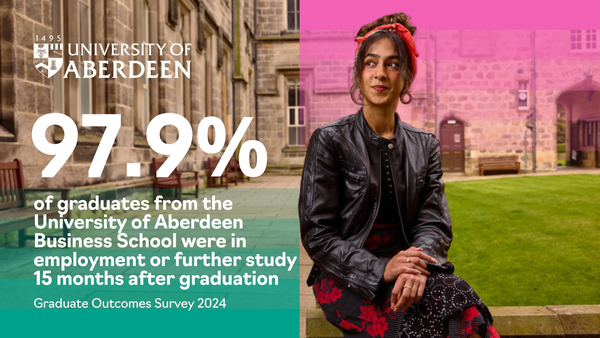
Introduction
Open for September 2025 applications.
Educating future leaders of the real estate profession, our Master's in Finance and Real Estate bridges the gap between undergraduate studies and the workforce. The programme combines the study of two complementary subject areas with leading industry accreditation and professional training to ensure you are industry-ready on a global level. The programme is designed to extend your capabilities in all financial aspects of real estate and property development with a focus on international real estate markets and commercial property valuation and investment
Study Information
Study Options
- Learning Mode
- On Campus Learning
- Degree Qualification
- MSc
- Duration
- 12 months or 24 months
- Study Mode
- Full Time or Part Time
- Start Month
- September
- Location of Study
- Aberdeen
This programme holds accreditation from Royal Institution of Chartered Surveyors (RICS), which allows graduates to progress on to the RICS Assessment of Professional Competence (APC). It also runs in parallel with the globally recognised qualification - CFA Level 1, so you have a choice and the opportunity to complete a leading professional qualification as part of your studies. Additionally, the Investment Property Forum has included this programme on its selected list of graduate programmes that they consider to provide the relevant skills necessary for those operating in the property investment market.
In the third term students have a further choice of three options which open up opportunities for a commercial or an international focus of study, either by writing a traditional dissertation, or visiting a range of cities in Asia as part of the Asian Cities course with associated reports based on learning from the trip. (Students will incur the costs of this course plus the travel, accommodation and subsistence for their time in Asia) or, undertaking a work placement in professional practice. Students are responsible for finding their own placement, but staff are there to support and guide students in this.
The University of Aberdeen is a leader in teaching and research in the field of real estate and this programme builds on our considerable strengths in these areas. The Business School is home to The Centre for Real Estate Research (CRER). Since inception in 1995, the CRER has matured into an established and internationally recognised research grouping: it supports members in the development of collaborative research activity and seeks to shape the rapidly emerging international research agenda in real estate. This active and collaborative research community ensures that the course content remains at the forefront of current thinking and gives our students the great advantage of accessing a wealth of powerful data.
Available Programmes of Study
- MSc
-
Finance and Real Estate
Qualification Duration Learning Mode Study Mode Start Month LocationMSc 12 months On Campus Learning Full Time September Aberdeen MoreMSc 24 months On Campus Learning Part Time September Aberdeen MoreProgramme Fees
Fee information Fee category Cost UK £15,700 Tuition Fees for 2024/25 Academic Year EU / International students £26,250 Tuition Fees for 2025/26 Academic Year
We will endeavour to make all course options available. However, these may be subject to change - see our Student Terms and Conditions page.
Fee Information
An option may be available to include our Asian Cities tour modules in lieu of the dissertation at a cost of £1,000 for the tuition fees only. Students doing this option must note that they are responsible for travel and accommodation expenses additional to this sum. All fees are subject to annual review.
Additional Fee Information
- Fees for individual programmes can be viewed in the Programmes section above.
- In exceptional circumstances there may be additional fees associated with specialist courses, for example field trips. Any additional fees for a course can be found in our Catalogue of Courses.
- For more information about tuition fees for this programme, including payment plans and our refund policy, please visit our Tuition Fees page.
Funding Opportunities
The University of Aberdeen provides an Alumni Discount Scheme:
The University of Aberdeen is very pleased to offer a 20% discount on postgraduate tuition fees for all alumni who have graduated with a degree from the University of Aberdeen. More Information can be found here.
Scholarships
All eligible self-funded international Postgraduate Masters students starting in September 2025 will receive an £8,000 scholarship. Learn more about this Aberdeen Global Scholarship here.
To see our full range of scholarships, visit our Funding Database.
How You'll Study
Learning Methods
- Field Trips
- Individual Projects
- Lectures
- Research
- Seminars
- Tutorials
Assessment Methods
By course work, group work, presentations, by written examination or by a combination of those, as prescribed for each course.
Why Study Finance and Real Estate?
This programme offers:
- excellence with relevance
- a 'conversion' programme that can be completed in a single year as a route to a professional career in real estate
- combine two complementary specialisms within one degree programme
- the skill sets, employable knowledge and the practical experience demanded by financial and real estate markets and appropriate techniques applied in these markets.
- the only professional accredited Master's in Scotland within a business school
- multi-disciplinary input (Economics, Finance, Law and construction as well as Real Estate)
- research-led education
- Investment Property Forum (IPF) has included this programme on their selected list of graduate programmes that they consider to provide the relevant skills necessary for those operating in the property investment market
- excellent employment prospects
The University of Aberdeen has been ranked 3rd in the UK, 4th in Europe and 19th in the world for its real estate research (EduRank 2024)
The University of Aberdeen has also been ranked 12th in the UK in the Guardian University Guide 2025 and 15th in the Times and Sunday Times Good University Guide 2025.
With a community of over 130 nationalities at the University of Aberdeen, students are immersed in an environment that enables international discourse creating truly global exchanges, generating deep insights that spark innovative change.
Entry Requirements
Qualifications
The information below is provided as a guide only and does not guarantee entry to the University of Aberdeen.
Our minimum entry requirement for this programme is an undergraduate degree at UK Honours level (or a degree from a non-UK institution which is judged by the University to be of equivalent worth).
Please enter your country or territory to view relevant entry requirements.
English Language Requirements
To study for a Postgraduate Taught degree at the University of Aberdeen it is essential that you can speak, understand, read, and write English fluently. The minimum requirements for this degree are as follows:
IELTS Academic:
OVERALL - 6.5 with: Listening - 5.5; Reading - 6.0; Speaking - 5.5; Writing - 6.0
TOEFL iBT:
OVERALL - 90 with: Listening - 17; Reading - 21; Speaking - 20; Writing - 21
PTE Academic:
OVERALL - 62 with: Listening - 59; Reading - 59; Speaking - 59; Writing - 59
Cambridge English B2 First, C1 Advanced or C2 Proficiency:
OVERALL - 176 with: Listening - 162; Reading - 169; Speaking - 162; Writing - 169
Read more about specific English Language requirements here.
Document Requirements
You will be required to supply the following documentation with your application as proof you meet the entry requirements of this degree programme. If you have not yet completed your current programme of study, then you can still apply and you can provide your Degree Certificate at a later date.
- Degree Transcript
- a full transcript showing all the subjects you studied and the marks you have achieved in your degree(s) (original & official English translation)
- Personal Statement
- a detailed personal statement explaining your motivation for this particular programme
Aberdeen Global Scholarship
Eligible self-funded Postgraduate Taught (PGT) students will receive the Aberdeen Global Scholarship. Eligibility details and further information are available on our dedicated page.
Aberdeen Global ScholarshipCareers
This MSc’s unique combined programme provides a credible platform for both finance and real estate career options – preparing students for rewarding posts in real estate finance or real estate portfolio management. Once you possess the key professional skills and commercial knowledge this programme provides, you’ll have greater scope to apply for higher-level positions and enjoy higher levels of reward.
Our MSc graduates have entered into a wide variety of employment, including professional firms, finance, real estate research, consultancy and the public sector.
Industry Links
The Real Estate Group has strong links with the profession with practitioners regularly involved in workshops and field trips.
Accreditation
Accreditation and world-wide recognition from the Royal Institution of Chartered Surveyors (RICS) allows graduates to proceed to the RICS Assessment of Professional Competence (APC).
This degree is also recognised by the well-respected Investment Property Forum (IPF). All of which gives you strong advantages in the jobs market - which makes a very compelling argument for choosing Aberdeen.
The Business School is EQUIS accredited, placing it among a select group of globally recognised institutions. Out of over 15,000 business schools worldwide, only around 200 schools across 45 countries have attained this distinction.
This degree holds accreditation from
What our Alumni Say
Our Experts
You will be taught by and have access to a number of experts, many of whom are internationally renowned within their respective fields. These will include members of The Centre for Real Estate Research.
For more details on academic experts and those who will be teaching within your programme discipline please visit the People section of the Business School website
- Programme Leader
- Fiona Stoddard
Information About Staff Changes
You will be taught by a range of experts including professors, lecturers, teaching fellows and postgraduate tutors. However, these may be subject to change - see our Student Terms and Conditions page.
World Class Facilities
The University of Aberdeen, established in 1495, is Scotland’s third oldest and the UK’s fifth oldest University. The university’s ancient campus reflects its long-standing academic tradition, with historic buildings such as King's College, which dates back to the 15th century. This blend of ancient architecture and modern facilities creates a unique atmosphere where students can experience the best of both tradition and innovation.

Sir Duncan Rice Library
The University’s award winning Sir Duncan Rice Library is listed in the “Top 20 spellbinding University libraries in the World”. It contains over a million volumes, more than 300,000 e-books and 21,000 journals.
Find out more
Affordability
Aberdeen has been named the cheapest place for students to rent private accommodation in the UK. In 2024, StuRents reports that the average price of a student private rental property in the Granite City was just over £96 a week.

Aberdeen City
Named Scotland's Safest University City (Unbroken Britain Survey, Provident Financial, 2018) and is in the top 10 in the UK for places to live and work (PricewaterhouseCoopers, 2018).
Get in Touch
Contact Details
- Address
-
Business School
University of Aberdeen
MacRobert Building
King Street
Aberdeen
AB24 3FX




